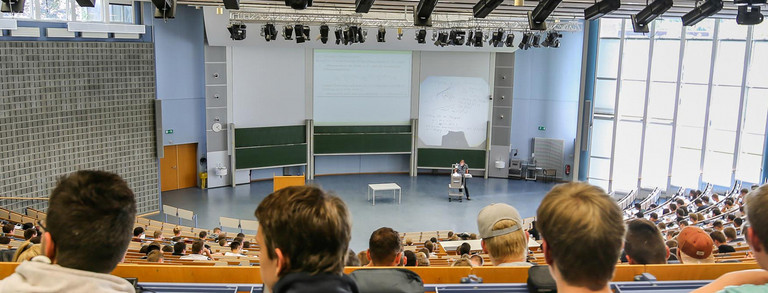Chemical Biology
Summary
| Degree | Bachelor of Science (B.Sc.) |
|---|---|
| Subject group | Natural Sciences and Computer Sciences |
| Standard program duration | 6 semesters |
| Admission requirements |
none
Overview NC procedure |
| Start of studies |
Winter semester
|
| Language | German |
| Further information | Website of Department of Chemistry and Chemical Biology |
Overview
During the degree program in Chemical Biology, students learn in theory and practice about the properties of biomolecules and how they can be used to carry out reactions, e.g. for new products. The Bachelor's degree program in Chemical Biology has a strong interdisciplinary focus and is offered in cooperation with the neighbouring Max Planck Institute of Molecular Physiology.
The Bachelor's degree program in Chemical Biology consists of the following modules:
- Chemistry (general, inorganic, organic and physical)
- Toxicology and Law
- Mathematics and Statistical Methods
- Physics
- Methods of Structure Elucidation
- Biochemistry and Molecular Biology
- Cell Biology
- Synthetic Biology
- Bioorganic, Bioinorganic and Biophysical Chemistry
- Compulsory Elective Course
Most of the compulsory courses are accompanied by laboratory practical courses. Together with the associated seminars, these comprise 47% of the attendance time in the program. In addition, there is the Bachelor's thesis, which has a large practical component and introduces students to scientific work.
Due to the focus on chemical processes in biological systems, the program is more chemically oriented than most biochemistry programs.
Skills and knowledge
No previous knowledge or practical experience of chemistry or biology is required, as all the basics are taught during the program. However, the more chemistry knowledge students have, the easier it will be to get started. A basic knowledge of mathematics is required. Towards the end of the Bachelor's degree program, it is necessary to read and understand scientific publications in English, and it may be the case that advanced laboratory courses are supervised by English-speaking PhD students and protocols have to be written in English. A basic knowledge of English is therefore an advantage. However, this can be acquired and improved during the course of the programme by attending free language courses at the TU Dortmund.
In general, students should enjoy chemistry and biochemistry, as well as experimentation. Students should also have the ability to work in a team, be persistent, motivated, enjoy learning and be able to work independently.
To prepare students for their studies, the Faculty of Chemistry and Chemical Biology offers a preparatory course during the last two weeks before the start of the program in the winter semester. In this course, chemical and mathematical material is repeated.
Field of activity
Chemical Biologists have a wide range of career prospects, for example in the following areas:
After graduation, chemical biologists can work in areas such as
- Basic research
- New pharmaceutical agents
- Biosensor development
- Biotechnological products
- Diagnostic methods
- Food additives
- Cosmetics and detergents
- Development of medical measurement methods and devices
The majority of graduates work in research. However, there are also career opportunities in product management, clinical trials, quality management, analysis, sales, marketing, patents, documentation, organisation, public relations, business consultancy, pharmaceutical consultancy, etc.
The Bachelor's degree qualifies students for professional life. However, almost all students go on to study for a Master's degree.
Additional information
A special feature of the Bachelor's degree course in Chemical Biology at TU Dortmund University is the intensive support offered to students in the introductory phase of their studies through a preparatory course, various information events, a mentoring program and events organized by the student council during the orientation phase. In addition, tutorials are offered in the first semesters of study in addition to exercise groups, in which individual questions about the respective courses can be clarified.
A semester or year abroad is particularly possible in the Master's phase, as there are no longer any compulsory courses to complete, only compulsory elective courses with certain framework requirements. Various courses, a research laboratory course or the Master's thesis can be completed abroad.





![[Translate to English:] Partner Four hands are holding the green logo of TU Dortmund University](/storages/tu_website/_processed_/1/d/csm_Partner_Nicole_Rechmann_KW_670eba0154.jpg)




![[Translate to English:] Forschung An apparatus with tubes in a laboratory](/storages/tu_website/_processed_/0/c/csm_Forschung_Juergen_Huhn_4fa3153b51.jpg)
![[Translate to English:] Studium Five students are sitting in a lecture hall. They are talking to each other.](/storages/tu_website/_processed_/c/9/csm_Studium_FelixSchmale_dbdbfb0dd7.jpg)





